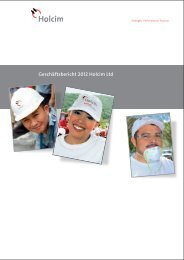Transocean Proxy Statement and 2010 Annual Report
Transocean Proxy Statement and 2010 Annual Report
Transocean Proxy Statement and 2010 Annual Report
Create successful ePaper yourself
Turn your PDF publications into a flip-book with our unique Google optimized e-Paper software.
TRANSOCEAN LTD. AND SUBSIDIARIES<br />
NOTES TO CONSOLIDATED FINANCIAL STATEMENTS — Continued<br />
Additionally, suits have been filed by the State of Alabama <strong>and</strong> the cities of Greenville, Evergreen, Georgiana <strong>and</strong> McKenzie,<br />
Alabama in the U.S. District Court, Middle District of Alabama; the Mexican States of Veracruz, Quintana Roo <strong>and</strong> Tamaulipas in the U.S.<br />
District Court, Western District of Texas; <strong>and</strong> the City of Panama City Beach, Florida in the U.S. District Court, Northern District of Florida.<br />
Generally, these governmental entities allege economic losses under OPA <strong>and</strong> other statutory environmental state claims <strong>and</strong> also assert<br />
various common law state claims. The claims of the State of Alabama, the cities in Alabama, <strong>and</strong> the Mexican States have been<br />
centralized in the MDL <strong>and</strong> will proceed in accordance with the MDL scheduling order, <strong>and</strong> the City of Panama City Beach’s claim was<br />
voluntarily dismissed.<br />
By letter dated May 5, <strong>2010</strong>, the Attorneys General of the five Gulf Coast states of Alabama, Florida, Louisiana, Mississippi <strong>and</strong><br />
Texas informed us that they intend to seek recovery of pollution clean-up costs <strong>and</strong> related damages arising from the Macondo well<br />
incident. In addition, by letter dated June 21, <strong>2010</strong>, the Attorneys General of the 11 Atlantic Coast states of Connecticut, Delaware,<br />
Georgia, Maine, Maryl<strong>and</strong>, Massachusetts, New Hampshire, New York, North Carolina, Rhode Isl<strong>and</strong> <strong>and</strong> South Carolina informed us that<br />
their states have not sustained any damage from the Macondo well incident but they would like assurances that we will be responsible<br />
financially if damages are sustained. We responded to each letter from the Attorneys General <strong>and</strong> indicated that we intend to fulfill our<br />
obligations as a responsible party for any discharge of oil from Deepwater Horizon on or above the surface of the water, <strong>and</strong> we assume<br />
that the operator will similarly fulfill its obligations under OPA for discharges from the undersea well. Other than the lawsuit filed by the<br />
State of Alabama discussed above, no further requests have been made or actions taken with regard to the initial communication.<br />
Wreck removal—By letter dated December 6, <strong>2010</strong>, the Coast Guard requested us to formulate <strong>and</strong> submit a comprehensive oil<br />
removal plan to remove any diesel fuel contained in the sponsons <strong>and</strong> fuel tanks that can be recovered from Deepwater Horizon. We have<br />
conducted a survey of the rig wreckage <strong>and</strong> are reviewing the results. We have insurance coverage for wreck removal for up to 25 percent<br />
of Deepwater Horizon’s insured value, or $140 million, with any excess wreck removal liability generally covered to the extent of our<br />
remaining excess liability limits.<br />
Contractual indemnity—Under our drilling contract for Deepwater Horizon, the operator has agreed, among other things, to<br />
assume full responsibility for <strong>and</strong> defend, release <strong>and</strong> indemnify us from any loss, expense, claim, fine, penalty or liability for pollution or<br />
contamination, including control <strong>and</strong> removal thereof, arising out of or connected with operations under the contract other than for pollution<br />
or contamination originating on or above the surface of the water from hydrocarbons or other specified substances within the control <strong>and</strong><br />
possession of the contractor, as to which we agreed to assume responsibility <strong>and</strong> protect, release <strong>and</strong> indemnify the operator. Although<br />
we do not believe it is applicable to the Macondo well incident, we also agreed to indemnify <strong>and</strong> defend the operator up to a limit of<br />
$15 million for claims for loss or damage to third parties arising from pollution caused by the rig while it is off the drilling location, while the<br />
rig is underway or during drive off or drift off of the rig from the drilling location. The operator has also agreed, among other things, (1) to<br />
defend, release <strong>and</strong> indemnify us against loss or damage to the reservoir, <strong>and</strong> loss of property rights to oil, gas <strong>and</strong> minerals below the<br />
surface of the earth <strong>and</strong> (2) to defend, release <strong>and</strong> indemnify us <strong>and</strong> bear the cost of bringing the well under control in the event of a<br />
blowout or other loss of control. We agreed to defend, release <strong>and</strong> indemnify the operator for personal injury <strong>and</strong> death of our employees,<br />
invitees <strong>and</strong> the employees of our subcontractors while the operator agreed to defend, release <strong>and</strong> indemnify us for personal injury <strong>and</strong><br />
death of its employees, invitees <strong>and</strong> the employees of its other subcontractors, other than us. We have also agreed to defend, release <strong>and</strong><br />
indemnify the operator for damages to the rig <strong>and</strong> equipment, including salvage or removal costs.<br />
Although we believe we are entitled to contractual defense <strong>and</strong> indemnity, given the potential amounts involved in connection<br />
with the Macondo well incident, the operator may seek to avoid its indemnification obligations. In particular, the operator, in response to<br />
our request for indemnification, has generally reserved all of its rights <strong>and</strong> stated that it could not at this time conclude that it is obligated to<br />
indemnify us. In doing so, the operator has asserted that the facts are not sufficiently developed to determine who is responsible <strong>and</strong> has<br />
cited a variety of possible legal theories based upon the contract <strong>and</strong> facts still to be developed. We believe this reservation of rights is<br />
without justification <strong>and</strong> that the operator is required to honor its indemnification obligations contained in our contract <strong>and</strong> described above.<br />
Other legal proceedings<br />
Asbestos litigation—In 2004, several of our subsidiaries were named, along with numerous other unaffiliated defendants, in<br />
21 complaints filed on behalf of 769 plaintiffs in the Circuit Courts of the State of Mississippi <strong>and</strong> which claimed injuries arising out of<br />
exposure to asbestos allegedly contained in drilling mud during these plaintiffs’ employment in drilling activities between 1965 <strong>and</strong> 1986. A<br />
Special Master, appointed to administer these cases pre-trial, subsequently required that each individual plaintiff file a separate lawsuit,<br />
<strong>and</strong> the original 21 multi-plaintiff complaints were then dismissed by the Circuit Courts. The amended complaints resulted in one of our<br />
subsidiaries being named as a direct defendant in seven cases. We have or may have an indirect interest in an additional 12 cases. The<br />
complaints generally allege that the defendants used or manufactured asbestos-containing products in connection with drilling operations<br />
<strong>and</strong> have included allegations of negligence, products liability, strict liability <strong>and</strong> claims allowed under the Jones Act <strong>and</strong> general maritime<br />
law. The plaintiffs generally seek awards of unspecified compensatory <strong>and</strong> punitive damages. In each of these cases, the complaints<br />
have named other unaffiliated defendant companies, including companies that allegedly manufactured the drilling-related products that<br />
contained asbestos. The preliminary information available on these claims is not sufficient to determine if there is an identifiable period for<br />
alleged exposure to asbestos, whether any asbestos exposure in fact occurred, the vessels potentially involved in the claims, or the basis<br />
on which the plaintiffs would support claims that their injuries were related to exposure to asbestos. However, the initial evidence available<br />
would suggest that we would have significant defenses to liability <strong>and</strong> damages. In 2009, two cases that were part of the original 2004<br />
multi-plaintiff suits went to trial in Mississippi against unaffiliated defendant companies which allegedly manufactured drilling-related<br />
products containing asbestos. We were not a defendant in either of these cases. One of the cases resulted in a substantial jury verdict in<br />
AR-105

















